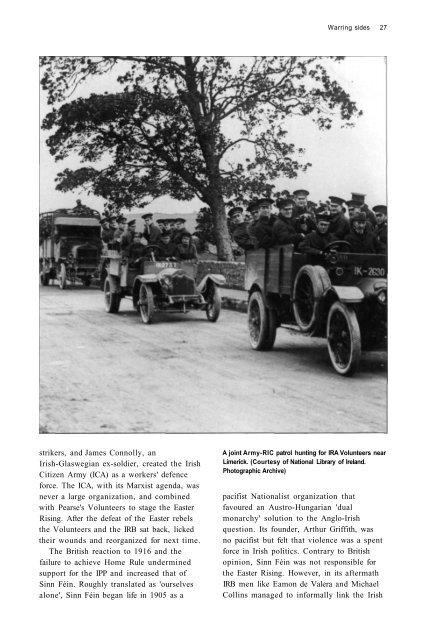Create successful ePaper yourself
Turn your PDF publications into a flip-book with our unique Google optimized e-Paper software.
<strong>War</strong>ring sides 27<br />
strikers, and James Connolly, an<br />
<strong>Irish</strong>-Glaswegian ex-soldier, created the <strong>Irish</strong><br />
Citizen Army (ICA) as a workers' defence<br />
force. <strong>The</strong> ICA, with its Marxist agenda, was<br />
never a large organization, and combined<br />
with Pearse's Volunteers to stage the Easter<br />
Rising. After the defeat of the Easter rebels<br />
the Volunteers and the IRB sat back, licked<br />
their wounds and reorganized for next time.<br />
<strong>The</strong> British reaction to 1916 and the<br />
failure to achieve Home Rule undermined<br />
support for the IPP and increased that of<br />
Sinn Féin. Roughly translated as 'ourselves<br />
alone', Sinn Féin began life in 1905 as a<br />
A joint Army-RIC patrol hunting for IRA Volunteers near<br />
Limerick. (Courtesy of National Library of Ireland.<br />
Photographic Archive)<br />
pacifist Nationalist organization that<br />
favoured an Austro-Hungarian 'dual<br />
monarchy' solution to the <strong>Anglo</strong>-<strong>Irish</strong><br />
question. Its founder, Arthur Griffith, was<br />
no pacifist but felt that violence was a spent<br />
force in <strong>Irish</strong> politics. Contrary to British<br />
opinion, Sinn Féin was not responsible for<br />
the Easter Rising. However, in its aftermath<br />
IRB men like Eamon de Valera and Michael<br />
Collins managed to informally link the <strong>Irish</strong>



